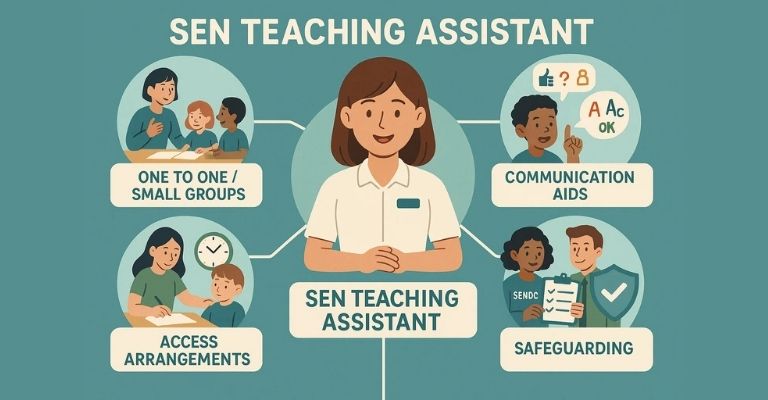Do you want to know how to become a SEN teaching assistant in the UK? If you enjoy helping children with special educational needs learn and grow, this career could be perfect for you. It’s a job full of purpose and heart, where every small success feels truly rewarding.
To get started, you’ll usually need GCSEs in English and maths, grades 9–4 or C and above. You’ll also need an enhanced DBS check with the children’s barred list because you’ll be working closely with pupils every day. Then, once you join a school, you’ll complete an induction under the latest KCSIE 2025 rules.
In this article, you’ll learn what qualifications you need, how to get the right training, and what checks and steps are required before working with children. By the end, you’ll have a clear idea of what it takes to start your journey as a SEN teaching assistant and how to build a rewarding career helping children with special educational needs.
What Does a SEN Teaching Assistant Do?

So, what does a teaching assistant do — especially in a SEN setting? A SEN teaching assistant supports children who have special educational needs in school. Every day is different, but your goal is always the same: to help each child feel included, confident, and ready to learn.
Here are some of the main things a SEN teaching assistant does:
- Work one-to-one or in small groups to support pupils with learning, communication, or social skills.
- Use communication aids like PECS or Makaton to help children express themselves more easily.
- Support behaviour and sensory regulation, creating a calm and safe classroom environment.
- Follow access arrangements, giving pupils extra help or time so they can take part fully in lessons.
- Work closely with the SENDCo, teachers, and therapists to plan and review each child’s progress.
- Follow safeguarding rules at all times to keep pupils safe and protected in school.
Each of these tasks may seem small, but together they make a big difference. A SEN teaching assistant helps children learn, feel confident, and reach their potential — and that’s what makes this job so special.
What Qualifications Do You Need to Be a SEN Teaching Assistant?
Many people ask, “what qualifications do I need to be a teaching assistant?” There is no single licence for this job, but schools usually ask for some basic qualifications and training before you start.
Most schools look for:
- GCSEs in English and maths (grades 9–4 or C and above). These help you support pupils with reading, writing, and maths.
- A Level 2 or Level 3 Supporting Teaching and Learning course. This is a common way to begin working in schools.
- A Level 3 Teaching Assistant apprenticeship, approved by IfATE and Skills England. It usually takes 15 to 18 months and gives you real classroom experience.
From September 2025, new SEND training courses will also be available. These will help you learn more about supporting children with special needs.
So, if you are asking, “do I need qualifications to be a teaching assistant?” — yes, but there are different ways to get them. Taking a teaching assistant course is the best first step. It helps you build confidence, learn real classroom skills, and start a career where you can make a big difference in children’s lives.
If you’d like to build the skills and confidence needed for this role, you can explore the How to Be a Teaching Assistant. It’s a great way to understand classroom support, gain real knowledge, and start your journey towards becoming an amazing SEN teaching assistant.
Do You Need Experience to Work as a SEN Teaching Assistant?
Many people ask if they can become a teaching assistant with no experience. The good news is — yes, you can. Some schools and apprenticeships accept new starters who show interest, patience, and good safeguarding awareness.
However, having experience with children always helps. Schools often prefer candidates who have worked or volunteered with children, especially those with special educational needs. Even a little experience can help you understand how to support pupils and stay calm in different situations.
You can gain experience by:
- Volunteering in schools or nurseries.
- Helping in youth clubs or after-school programmes.
- Supporting charity projects that work with children or young people.
- Working in respite care or community centres that help children with SEND.
According to the National Careers Service, experience makes your application stronger and helps you feel more confident when working in a classroom.
So, if you’re wondering how to become a teaching assistant with no experience, start small. Volunteer when you can, learn from others, and show your passion for helping children. Every bit of experience counts and brings you closer to your first SEN teaching assistant job.
What Skills Help You Succeed as a SEN Teaching Assistant?

If you want to know how to be a good teaching assistant, you need the right mix of people skills and classroom confidence. Here are the key ones:
- Communication – Speak clearly, listen well, and share ideas with pupils and teachers.
- Patience – Stay calm and kind, even when things get busy or tough.
- Behaviour support – Help manage behaviour and keep lessons calm and safe.
- Awareness of SEND – Understand autism and speech or language needs.
- Teamwork – Work well with teachers and other staff.
- Basic ICT and record-keeping – Use simple computer tools and note pupil progress.
- Confidentiality – Keep pupil information private and safe.
These skills follow the Skills England apprenticeship standards and show what schools look for in a great SEN teaching assistant.
What Checks and Paperwork Do You Need (DBS, References, Safeguarding)?
Before you can start working as a teaching assistant, schools must make sure you are safe to work with children. These checks are very important because they protect both you and the pupils.
First, you’ll need an enhanced DBS check that includes the children’s barred list. This is a legal requirement for anyone working in a school. Sometimes, schools may check the barred list while your full DBS is still being processed, so you can begin work sooner.
Next, schools will ask for references, usually from past employers, teachers, or people who can confirm your good character and reliability. You’ll also need to show proof of ID and right to work documents, such as your passport, visa, or birth certificate.
Finally, every new staff member must complete a safeguarding induction under KCSIE 2025. This training helps you understand how to keep children safe and what to do if you ever have a concern.
These steps may take a little time, but they show your commitment to creating a safe and trusted school environment for every child.
What Training Courses Can Help You Become a SEN TA?
If you want to become a SEN teaching assistant, the right training can really boost your confidence and skills. While some schools offer on-the-job learning, completing a course helps you stand out and feel ready for classroom life.
You can start with the Level 2 or Level 3 Supporting Teaching and Learning course. These are the most common routes and teach you how to support pupils, plan activities, and follow school policies. Another great option is the Level 3 Teaching Assistant apprenticeship, which lets you earn and learn at the same time.
To work with children who have special educational needs, you can also take short CPD (Continuing Professional Development) courses. These include training in:
- Autism awareness – learn how to understand and support autistic pupils.
- ADHD and behaviour support – build strategies to handle classroom challenges calmly.
- Team-Teach – gain skills to manage behaviour safely and respectfully.
- PECS and Makaton – help children communicate more clearly.
- Sensory needs and regulation – create calm, focused learning spaces.
From September 2025, new SEND-specific qualifications for teaching assistants will be available through AIM and Ofqual-approved providers. These are designed to give you deeper knowledge about supporting children with complex needs.
Can You Become a SEN Teaching Assistant Without a Qualification?
Yes, you can become a SEN teaching assistant without a formal qualification — especially if you have the right attitude and a real passion for helping children. Some schools welcome new starters who show care, patience, and a strong understanding of safeguarding.
Many people begin by volunteering in a local school, nursery, or youth club. This hands-on experience helps you understand how classrooms work and lets teachers see your potential. Good references from these placements can often lead to paid entry-level roles.
However, while experience matters, completing a Level 2 or Level 3 Supporting Teaching and Learning qualification, or a Level 3 Teaching Assistant apprenticeship, will make you a stronger candidate. These qualifications also help you earn more and progress faster in your career.
Remember, what truly counts is your heart for supporting children with special needs. With dedication, learning, and the right support, you can build a rewarding career as a SEN teaching assistant — even without formal qualifications at first.
How Do SEN TA Roles Differ from General Teaching Assistant Roles?
While both roles support children in the classroom, SEN teaching assistants focus more on pupils who have special educational needs or disabilities. Their work goes a little deeper and often needs more patience, creativity, and flexibility.
A general teaching assistant helps the whole class by supporting lessons, preparing materials, and keeping pupils engaged. In contrast, a SEN TA provides more individual support and works closely with the SENDCo, teachers, and therapists to meet each child’s unique needs.
Here are some key differences between the two roles:
- Personalised support: SEN TAs often help one-to-one or in small groups to match each child’s learning style.
- Behaviour and sensory plans: They help pupils manage emotions, focus, and feel comfortable in the classroom.
- Communication systems: SEN TAs use tools like PECS or Makaton to help children express themselves clearly.
- Paperwork and observations: They record progress and support reviews for Education, Health and Care Plans (EHCPs).
- Multi-agency work: SEN TAs often work with speech therapists, psychologists, and parents to create consistent support plans.
So, while a general TA helps teachers run smooth lessons, a SEN TA becomes a key part of a child’s personal journey — helping them grow in confidence and independence every day.
What Is the Salary for SEN Teaching Assistants in the UK?
If you’re thinking about becoming a SEN teaching assistant, it’s natural to wonder how much you’ll earn. The good news is that most teaching assistants, including SEN TAs, are paid using the NJC local government pay scale — a national system that most councils and schools follow.
From 1 April 2025, there’s a 3.2% pay rise across the NJC scale. A common starting point for many SEN TAs is Spinal Column Point (SCP) 2, which is around £24,413 a year full-time. This equals roughly £12.65 per hour for a 37-hour week.
However, it’s important to know that most schools pay term-time only, so your actual yearly pay is usually pro-rata (a bit lower than the full amount). Some councils and schools also offer extra SEN or top-up allowances for working with pupils who have complex needs.
According to the National Careers Service, SEN teaching assistants typically earn:
- Around £19,000 a year when starting out.
- Up to £27,000 a year with experience.
Your final salary can vary depending on the school, local council, and your level of qualification. So, it’s always best to check your local authority’s NJC pay table or the specific job advert for the exact pay rate.
In short, while the pay can differ, working as a SEN teaching assistant offers something truly rewarding — the chance to make a lasting difference in children’s lives every single day.
How Do You Apply for SEN Teaching Assistant Jobs?
Applying for a SEN teaching assistant job is simple once you know where to look and how to prepare. Most schools hire through their local authority job portals, Multi-Academy Trust websites, or school career pages. So, it’s a good idea to check these regularly for new openings in your area.
When you find a job you like, take time to tailor your CV. Highlight your SEN experience, communication skills, and any training or courses you’ve completed, such as Level 2 or 3 Supporting Teaching and Learning. Also, mention your understanding of safeguarding, since schools follow the Keeping Children Safe in Education (KCSIE) guidelines.
If you’re new to the field, you can also look for apprenticeship opportunities through Skills England or the official Find an Apprenticeship service. These roles let you earn while you learn and gain classroom experience at the same time.
When applying, always include a short personal statement explaining why you love working with children who have special needs. Show your passion, patience, and teamwork skills — because these are what schools value most.
Finally, double-check your references and DBS status before applying. A well-prepared, thoughtful application can really help you stand out and move one step closer to becoming a SEN teaching assistant.
What Is the Career Progression for SEN Teaching Assistants?
One of the best things about being a SEN teaching assistant is that it can lead to many exciting career opportunities. With time, training, and experience, you can move into higher roles and earn more responsibility — and pay.
Most people start as a Teaching Assistant (TA) or Level 2 TA, learning how to support pupils and work alongside teachers. From there, you can progress to:
- Level 3 Teaching Assistant: You’ll take on more responsibility and may lead small group activities.
- SEN Specialist TA: You’ll focus on helping children with specific needs, such as autism, ADHD, or speech and language difficulties.
- Higher Level Teaching Assistant (HLTA): You can lead lessons, plan activities, and support teachers more independently.
- Specialist Roles: Some TAs go on to become Emotional Literacy Support Assistants (ELSAs) or work in behaviour or communication support.
- Teacher Training Routes: With the right qualifications, you can train to become a qualified teacher through a PGCE, school-based training, or a teaching apprenticeship.
As you move up, your NJC pay point and salary also increase. Each step gives you more confidence, skills, and the chance to make an even bigger impact on children’s learning and wellbeing.
So, if you’re wondering how to become a teacher from a teaching assistant, the SEN TA role is a fantastic place to begin — it builds the skills, experience, and heart that every great teacher needs.
FAQs About Becoming a SEN Teaching Assistant
1. How much do SEN teaching assistants get paid?
The average SEN teaching assistant salary is around £20,000 per year, though starting pay can be lower. Most SEN TAs work term-time only, supporting pupils with special needs throughout the school year.
2. Can you be a TA with no experience?
Yes, you can become a teaching assistant without experience, though it may be harder to get hired. Gaining school or volunteer experience can greatly improve your chances.
3. Does an Elsa get paid more than a TA?
Usually, ELSA roles pay about the same as regular teaching assistant positions. Pay mainly depends on your experience, qualifications, and the school’s budget.
4. Are there any free teaching assistant courses?
Yes, there are free teaching assistant courses available online. Some are government-funded Level 2 qualifications, while others are introductory courses from providers like Free Courses in England.
5. Are TA jobs at risk?
According to NCFE’s Angie Rogers, many skilled teaching assistants risk leaving education for other sectors due to job pressures.
Final Thoughts: Steps to Start Your SEN TA Career
Becoming a SEN teaching assistant is more than just a career choice — it’s a chance to make a real difference. With the right checks, training, and compassion, you can help children with special needs feel supported and confident every day. Start with your GCSEs, complete a Level 2 or 3 course, and gain hands-on experience. Step by step, you’ll build the skills to create brighter futures for every child you support.




